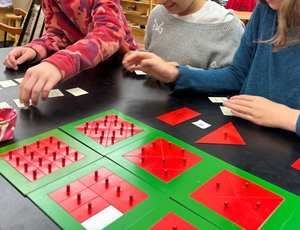Seeds to Success
Dear Parents,
Over the Memorial Day weekend, I was given an opportunity to sit and reflect over our first year together. Oftentimes we are wrapped up with our day to day activities and focused on future goals that we forget to reflect on our accomplishments. I would like to start a new tradition. Each year, I want to share with you our accomplishments and goals for the upcoming school year. This annual summary will focus on technology, security, facility enhancements, curriculum, and professional development. Our goals are determined with the feedback from all stakeholders. We have a lot to celebrate:
Technology
- Created and launched a new website
- Launched Procare management software to manage student data
Security
- Implemented Raptor Software to screen visitors on campus
- Created an Emergency Operations Plan
- Implemented a Keyless Entry System for parents and staff
Facility Enhancement
- Installed a wall to create a new multi-purpose room upstairs
- Repurposed spaces upstairs to expand the library, create a piano room, and office
- Created an inviting space for parents to meet in the lobby
- Created a new middle school space for the 2016-17 school year
- Added a new climber to outdoor classroom
- Created an indoor movement space with sensory activities for students
Curriculum
- Added 10 new computers to the upper elementary and middle school classroom.
- Incorporated Microsoft 360 for all students and staff
- Implemented Montessori Workspace an electronic recordkeeping system
- Enhanced our summer curriculum by offering STEM camps
- Incorporated Primary Phonics and SRA reading systems
Professional Development
- Six staff members attended the annual AMS conference in Chicago
- One staff member attended Minds in Motion training
- One staff member is completing their Montessori training
- One staff member is completing their Bachelor’s degree
As we look forward to the 2016-17 school year, we will celebrate 10 years of successful operations. Our immediate focus will be our AMS Accreditation and SACS reaccreditation visit that will be in November. Our AMS self-study team members have spent countless hours studying our policies and procedures and citing evidence that demonstrates how our school meets the strict AMS requirements. Once we have reached this goal, we will be the ONLY Montessori school in Louisville that is AMS and SACS accredited and one of two Montessori schools in the state to hold both accreditations.
Another area of focus to prepare for launching a capital campaign to fund the move to a new permanent home. It was amazing to reach our goal of 100% participation in our annual fund campaign. We hope that success continues for years to come. Through your feedback, we are implementing a new communication application that will increase family engagement with ease of use. Our toddler program is bursting at the seams. Next year we will expand our toddler program to include a new half day toddler program. At the elementary and middle school level, we will add a new online assessment tool that will allow our students to take more ownership of their learning.
We greatly appreciate the continued trust our families place in us with their child’s education; it is truly an honor and a privilege to be a part of their educational journey. You are a valued member of the MSL family and play such an important role in our learning community, fostering a strong home/school connection.
In closing, I would like to give a heartfelt “thank you” to the staff of MSL. This year brought tears of happiness and sorrow to our lives as we sent children to college, welcomed children, became married, battled illness, and lost loved ones. Words simply are not enough to express my gratitude.
Have a wonderful summer! I look forward to seeing everyone in August.
Gratefully,
Jennifer Cattell
Head of School






